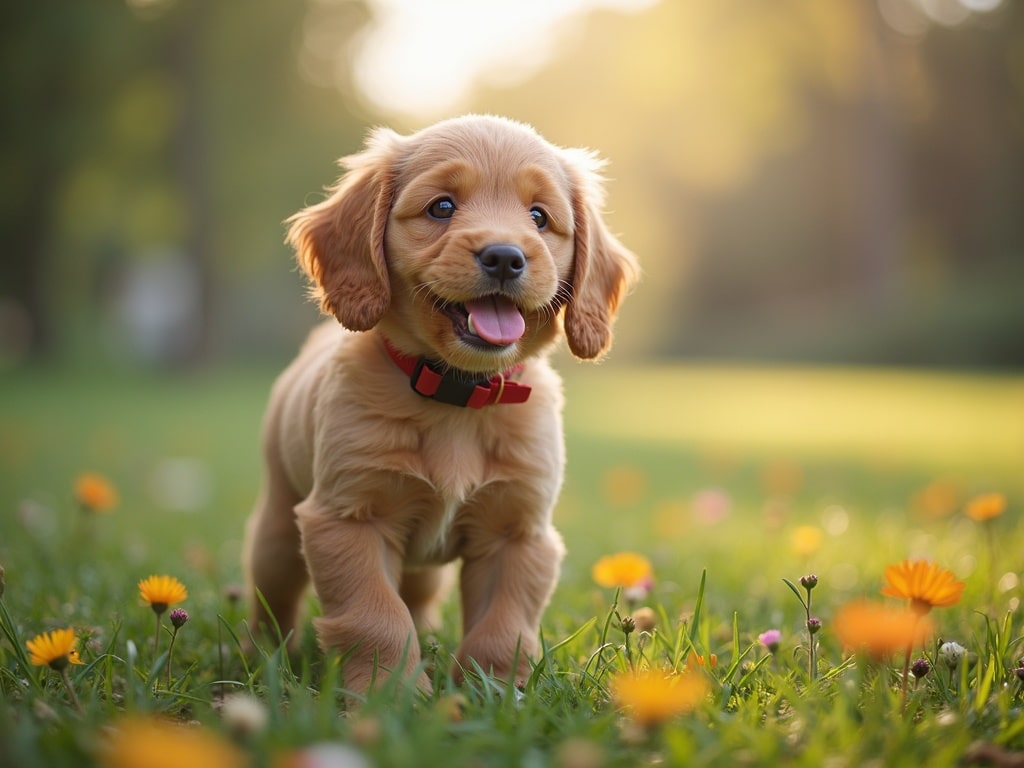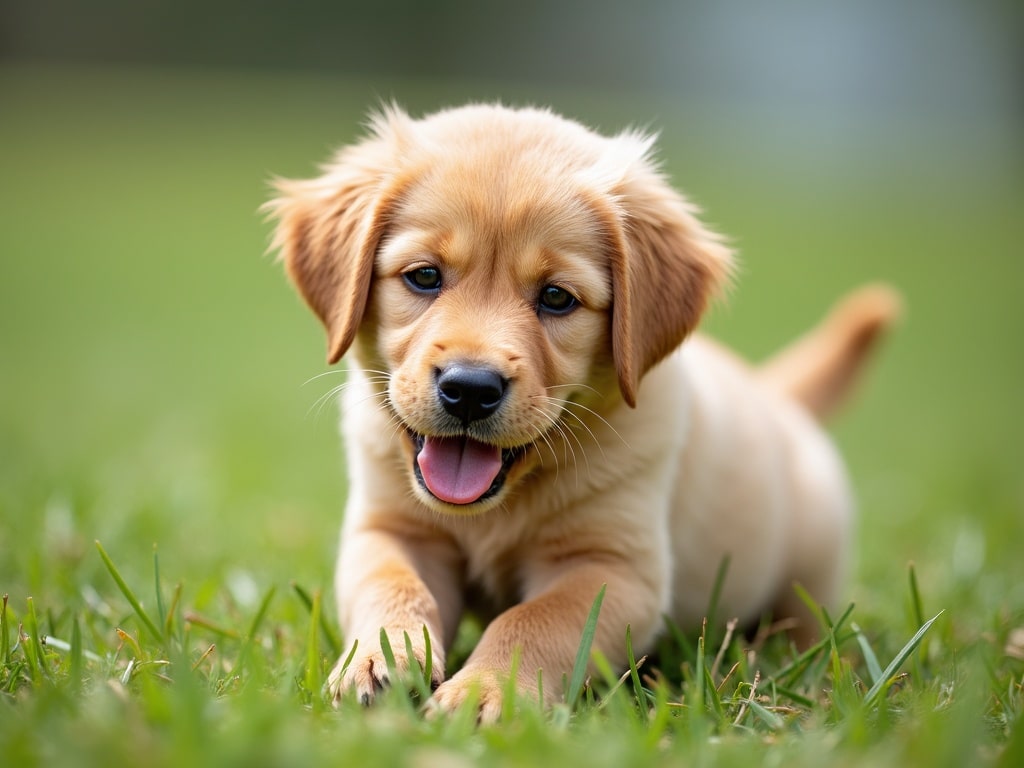How to Tire Out a Puppy: A Comprehensive Guide for Energetic Owners
The boundless energy of a puppy is one of life's great joys…until it's 3 a.m. and they're using your head as a springboard. Every puppy owner has faced the challenge of keeping their furry friend sufficiently exercised and mentally stimulated. A tired puppy is a good puppy: less destructive, more receptive to training, and generally happier. But tired doesn't mean collapsed from exhaustion. It's about striking the right balance. This article will explore proven strategies to channel that puppy exuberance into positive outlets, covering physical activities, mental games, and even dietary considerations, ensuring both you and your pup can enjoy a peaceful and fulfilling life together.
Understanding Puppy Energy Levels
Before diving into specific activities, it's important to understand that not all puppies are created equal. Energy levels vary drastically based on breed, age, health, and individual personality. A Border Collie puppy, bred for herding all day, will naturally have far more stamina than a Basset Hound pup. Age, too, is crucial. Very young puppies, under 12 weeks, tire more easily and require shorter, more frequent play sessions. As they grow, their endurance will increase.
Breed-Specific Considerations
Research your puppy's breed (or breeds, if it's a mix!). Certain breeds, like Huskies and Australian Shepherds, are genetically predisposed to high energy levels and require significant exercise. Others, like Bulldogs or Shih Tzus, are more laid-back and may be content with shorter walks and less intense play. Understanding your breed's inherent needs is the first step in managing their energy effectively. This knowledge helps you set realistic expectations and tailor your approach.
Age and Development
A general guideline is the “5-minute rule”: 5 minutes of exercise per month of age, twice a day. This means a 3-month-old puppy gets 15 minutes of exercise twice a day. This isn't a hard-and-fast rule, but a good starting point to avoid overexertion, which can damage developing joints and bones. Observe your puppy closely for signs of fatigue: excessive panting, lagging behind on walks, or simply lying down and refusing to move.
Physical Activities to Burn Puppy Energy
Physical exercise is the cornerstone of tiring out a puppy. However, it's crucial to choose activities appropriate for their age and physical condition. Overdoing it can lead to injuries and long-term health problems.
Walking and Leash Training
Walking is a fantastic way to physically tire out your puppy, but it's also an opportunity for socialization and training. Start with short, frequent walks and gradually increase the duration as your puppy gets older and stronger. Focus on positive reinforcement to teach leash manners, such as walking politely without pulling or lunging. Introduce them to different sights, sounds, and smells to stimulate their senses.
Fetch and Retrieve Games
Fetch is a classic puppy energy-burner. Use a soft ball or toy that's easy for your puppy to carry. Start with short distances and gradually increase the throwing range as they improve. This is a great way to work on recall training as well. Make it fun and engaging with enthusiastic praise. A flirt pole can also be used to tire out a puppy quickly. The unpredictable movement keeps them engaged and encourages lots of running and jumping.
Puppy Playdates
Socialization is crucial during puppyhood, and playdates with other vaccinated, healthy puppies are a great way to burn energy while learning valuable social skills. Supervise these interactions closely to ensure play remains positive and safe. A tired, well-socialized puppy is a happy puppy. Choose playmates that are of similar size and energy levels to avoid any potential mismatches or injuries.
Agility (Adapted for Puppies)
While full-blown agility courses aren't suitable for young puppies, you can adapt certain elements to create safe and stimulating challenges. Use low tunnels, small cones, or even household items to create a mini-obstacle course. Keep it simple and focus on positive reinforcement. This helps build confidence, coordination, and mental focus.
Mental Stimulation as an Energy Drain
Don't underestimate the power of mental stimulation! A bored puppy can quickly become a destructive puppy. Mental games and puzzles are excellent ways to tire them out without the same physical demands as running or playing fetch.
Puzzle Toys and Food Dispensers
Puzzle toys are designed to challenge your puppy's problem-solving skills. They come in various forms, from simple treat-dispensing balls to more complex contraptions that require your puppy to manipulate levers, buttons, or sliding panels to access the reward. These toys require focus and concentration, and the mental effort can be surprisingly tiring.
Training Sessions
Short, frequent training sessions are a fantastic way to engage your puppy's mind and reinforce good behavior. Focus on basic commands like sit, stay, come, and down. Keep the sessions positive and rewarding, using treats, praise, or toys as motivation. Even just 10-15 minutes of focused training can leave your puppy mentally exhausted in the best way.
Scent Work and Nose Games
Dogs have an incredible sense of smell, and scent work is a natural and enjoyable way to tap into this ability. Start by hiding treats or toys around the house and encouraging your puppy to find them using their nose. Gradually increase the difficulty by hiding the items in more challenging locations or introducing different scents. This activity is surprisingly tiring and helps build confidence and focus.

Interactive Games
Engage your puppy in interactive games that require them to think and problem-solve. For example, you can hide a treat under one of three cups and have them guess which one it's under. Or, teach them the names of their toys and ask them to retrieve specific ones. These games not only tire them out but also strengthen the bond between you and your pup.
The Importance of Rest and Routine
While it's important to provide plenty of opportunities for exercise and mental stimulation, it's equally important to ensure your puppy gets enough rest. Puppies need significantly more sleep than adult dogs, typically around 16-20 hours a day. A consistent routine of playtime, training, and rest can help regulate their energy levels and prevent overstimulation.
Creating a Calm Environment
Provide your puppy with a quiet and comfortable space where they can relax and sleep undisturbed. This could be a crate, a dog bed, or a designated corner of a room. Avoid loud noises, bright lights, and excessive activity in this area to create a calm and relaxing environment. Teach children to respect the puppy's rest time and avoid disturbing them when they are sleeping.
Recognizing Overtiredness
Just like children, puppies can become overtired and grumpy. Signs of overtiredness include excessive barking, biting, hyperactivity, and difficulty focusing. If you notice these signs, it's time to put your puppy down for a nap. Avoid pushing them to continue playing or training when they are clearly exhausted.
Routine is Key
Establishing a consistent daily routine can help regulate your puppy's energy levels and prevent them from becoming overly excited or anxious. This routine should include regular feeding times, walk times, playtime, training sessions, and nap times. Predictability can be incredibly comforting for puppies and helps them feel secure and confident.
Dietary Considerations for Puppy Energy
Believe it or not, your puppy's diet can also play a role in their energy levels. A high-quality puppy food that's specifically formulated for their age and breed is essential. Avoid foods with excessive sugar or artificial additives, as these can contribute to hyperactivity. Consult with your veterinarian about the best food options for your puppy.
Protein and Carbohydrates
Protein is essential for muscle development and overall health, while carbohydrates provide energy. However, it's important to choose healthy sources of carbohydrates, such as sweet potatoes or brown rice, rather than processed grains. The right balance of protein and carbohydrates will help sustain your puppy's energy levels throughout the day without causing spikes or crashes.
Avoiding Sugary Treats
Just like with children, sugary treats can lead to hyperactivity and energy crashes in puppies. Avoid giving them human treats or foods that are high in sugar. Instead, opt for healthy snacks like carrots, apple slices (without the core), or specially formulated dog treats. Always consult with your veterinarian before introducing any new foods into your puppy's diet.
Hydration is Crucial
Ensure your puppy always has access to fresh, clean water. Dehydration can lead to fatigue and decreased energy levels. Especially during warm weather or after strenuous exercise.
When to Seek Professional Help
If you're struggling to manage your puppy's energy levels despite implementing these strategies, it's always a good idea to consult with a veterinarian or a certified professional dog trainer. They can help identify any underlying medical or behavioral issues that may be contributing to the problem. In some cases, excessive energy may be a symptom of anxiety or other behavioral problems that require professional intervention.
Tiring out a puppy effectively is a multifaceted approach. By understanding their breed, age, and individual needs, and by implementing a combination of physical exercise, mental stimulation, and a consistent routine, you can help your furry friend channel their energy into positive outlets and enjoy a happy, balanced life. Remember, a tired puppy isn't just a good puppy; it's a healthier, happier, and more well-adjusted companion.

